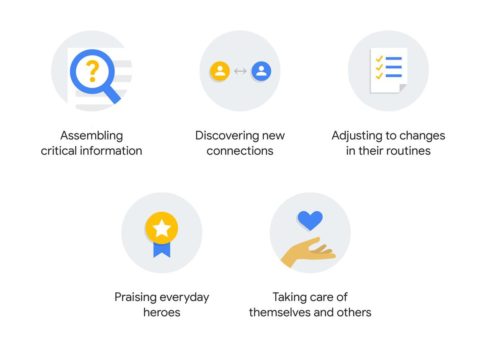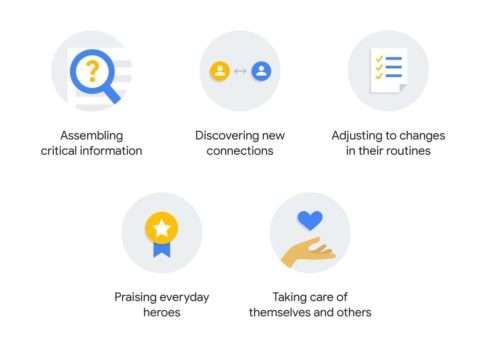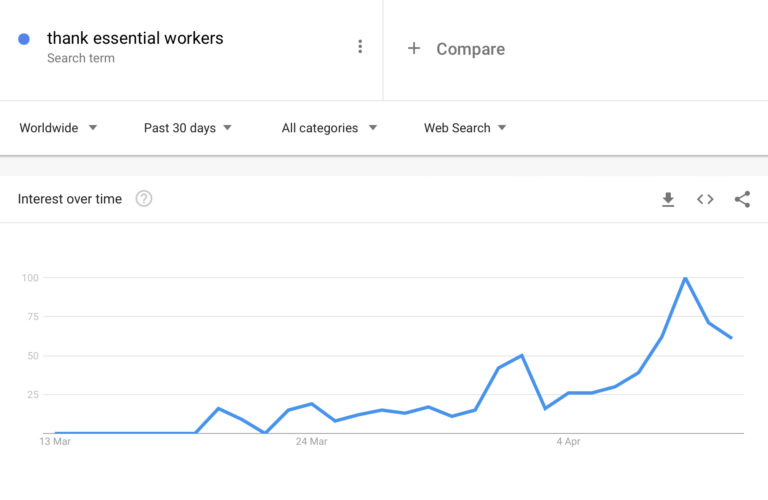The new app is called watchGPT and as I tipped off already, it gives you access to ChatGPT from your Apple Watch. Now the $10,000 question (or more accurately the $3.99 question, as that is the one-time cost of the app) is why having ChatGPT on your wrist is remotely necessary, so let’s dive into what exactly the app can do.
NEWS
Google Reveals How Search Behavior Has Changed During COVID-19 Pandemic

Google has published data on recent search trends, revealing the top 5 ways search behavior is changing during the pandemic.
This data has been compiled in an effort to assist marketers with being more helpful to customers during this time.
No organization is exempt from the shift in search behavior caused by the pandemic, and consumer behavior is changing daily as well.
Google summarized its finding by listing these as the 5 shifts in consumer search behavior.
- Assembling critical information
- Discovering new connections
- Adjusting to changes in their routines
- Praising everyday heroes
- Taking care of themselves and others

Here’s more details about each of these findings.
Assembling Critical Information
Consumers have a critical need for new content to help them get by and adapt to the recent changes in life.
Retailers are moving to delivery methods, schools are closed, much of the workforce is staying at home, among other changes.
Businesses and organizations need to provide clear, specific information with details about where, how, and when to get the things they need.
To that end, Google notes that search interest is spiking for the following topics:
- Retail
- “Can you freeze” different types of food
- Home delivery
- Short term work employee
- Mortgage rate suspension
Creating content that informs people about those topics is one of the ways marketers and brands can help consumers right now.
Google also offers these recommendations:
- Acknowledge the new reality.
- Give people credible, detailed, and current information about your operations. Reinforce that you’re there to help.
- Regularly update communications across your website, blogs, social handles, and Google My Business page.
- Be flexible. Help customers with cancellations, refunds, and customer service.
Connections & Relationships
As everyone suddenly finds themselves practicing social distancing, they’re discovering new connections and nurturing existing relationships.
For example, that could involve making virtual connections and/or strengthening connections within the household.
Search interest is spiking for the following topics:
- “With me” videos on YouTube
- “Study with me” videos up 54% year-over-year
- “Bulk cook with me” and “disinfect with me” are also trending right now
- Multiplayer video games
- Virtual happy hour
Google’s recommendations for helping consumers:
- Look for ways to connect your customers, locally and globally.
- Consider if your brand has a role to play in creating or enhancing shared experiences, virtually or otherwise.
Adjusting to Changes in Routines
People’s online habits are changing as they adjust their routines and schedules to meet the demands of isolation.
Google notes there have been spikes in search interest for topics such as “do it yourself,” “stationary bicycles,” and “dumbbell sets.”
There has also been an interest in watching other people adapt to their new routines.
For example, interest in late-night shows has been up ever since the hosts began producing content from their home.
Google’s recommendations for helping consumers as they adjust to new routines:
- Let people know that solutions are available whenever, wherever.
- Assess when people need you most, whether through your own first-party data (like site analytics or email opens) or Google Trends, and adjust your communications strategy accordingly.
- Update or publish often. There’s a need for content that informs, entertains, connects, and promotes wellness.
Praising Everyday Heroes
People are praising everyone from health care workers, to cashiers, to delivery people, and others still going in to work each day.
Many are risking their own health to do their job, which has lead to a spike in search interest for “thank essential workers.”

Google offers these recommendations for helping consumers with supporting everyday heroes:
- Look for people who are helping, and find ways to support or celebrate them.
- Consider who the heroes are among your employees, your customers, or even your local community.
- Consider whether you have nonhuman heroes that can contribute, like your technology, your operational rigor, or your equipment.
Taking Care of Themselves and Others
People are strengthening their efforts to take care of the physical and psychological needs of themselves and others.
Search interest is spiking for activities that can help ease boredom, anxiety, and uncertainty.
Those activities can be either virtual activities, or real-life activities.
People have taken to searching more for topics like “puzzles” and “relaxation,” as well virtual tours of galleries and museums.
Google offers these recommendations for helping people find new ways to enrich their lives:
- Facilitate virtual collaborations with outdoor spaces and the cultural institutions people yearn to visit.
- Join the conversation about home-based health and well-being.
- Pivot to platforms and formats that make sense for people staying home.
Final Notes
Google wraps up its report by emphasizing that the more useful businesses can be now the better off they’ll be on the long run.
According to survey results from late-March, 84% of US consumers say how companies act during the current market is important to their loyalty moving forward.
Source: Think With Google
Facebook Faces Yet Another Outage: Platform Encounters Technical Issues Again

Uppdated: It seems that today’s issues with Facebook haven’t affected as many users as the last time. A smaller group of people appears to be impacted this time around, which is a relief compared to the larger incident before. Nevertheless, it’s still frustrating for those affected, and hopefully, the issues will be resolved soon by the Facebook team.
Facebook had another problem today (March 20, 2024). According to Downdetector, a website that shows when other websites are not working, many people had trouble using Facebook.
This isn’t the first time Facebook has had issues. Just a little while ago, there was another problem that stopped people from using the site. Today, when people tried to use Facebook, it didn’t work like it should. People couldn’t see their friends’ posts, and sometimes the website wouldn’t even load.
Downdetector, which watches out for problems on websites, showed that lots of people were having trouble with Facebook. People from all over the world said they couldn’t use the site, and they were not happy about it.
When websites like Facebook have problems, it affects a lot of people. It’s not just about not being able to see posts or chat with friends. It can also impact businesses that use Facebook to reach customers.
Since Facebook owns Messenger and Instagram, the problems with Facebook also meant that people had trouble using these apps. It made the situation even more frustrating for many users, who rely on these apps to stay connected with others.
During this recent problem, one thing is obvious: the internet is always changing, and even big websites like Facebook can have problems. While people wait for Facebook to fix the issue, it shows us how easily things online can go wrong. It’s a good reminder that we should have backup plans for staying connected online, just in case something like this happens again.
NEWS
We asked ChatGPT what will be Google (GOOG) stock price for 2030

Investors who have invested in Alphabet Inc. (NASDAQ: GOOG) stock have reaped significant benefits from the company’s robust financial performance over the last five years. Google’s dominance in the online advertising market has been a key driver of the company’s consistent revenue growth and impressive profit margins.
In addition, Google has expanded its operations into related fields such as cloud computing and artificial intelligence. These areas show great promise as future growth drivers, making them increasingly attractive to investors. Notably, Alphabet’s stock price has been rising due to investor interest in the company’s recent initiatives in the fast-developing field of artificial intelligence (AI), adding generative AI features to Gmail and Google Docs.
However, when it comes to predicting the future pricing of a corporation like Google, there are many factors to consider. With this in mind, Finbold turned to the artificial intelligence tool ChatGPT to suggest a likely pricing range for GOOG stock by 2030. Although the tool was unable to give a definitive price range, it did note the following:
“Over the long term, Google has a track record of strong financial performance and has shown an ability to adapt to changing market conditions. As such, it’s reasonable to expect that Google’s stock price may continue to appreciate over time.”
GOOG stock price prediction
While attempting to estimate the price range of future transactions, it is essential to consider a variety of measures in addition to the AI chat tool, which includes deep learning algorithms and stock market experts.
Finbold collected forecasts provided by CoinPriceForecast, a finance prediction tool that utilizes machine self-learning technology, to anticipate Google stock price by the end of 2030 to compare with ChatGPT’s projection.
According to the most recent long-term estimate, which Finbold obtained on March 20, the price of Google will rise beyond $200 in 2030 and touch $247 by the end of the year, which would indicate a 141% gain from today to the end of the year.
Google has been assigned a recommendation of ‘strong buy’ by the majority of analysts working on Wall Street for a more near-term time frame. Significantly, 36 analysts of the 48 have recommended a “strong buy,” while seven people have advocated a “buy.” The remaining five analysts had given a ‘hold’ rating.

The average price projection for Alphabet stock over the last three months has been $125.32; this objective represents a 22.31% upside from its current price. It’s interesting to note that the maximum price forecast for the next year is $160, representing a gain of 56.16% from the stock’s current price of $102.46.
While the outlook for Google stock may be positive, it’s important to keep in mind that some potential challenges and risks could impact its performance, including competition from ChatGPT itself, which could affect Google’s price.
Disclaimer: The content on this site should not be considered investment advice. Investing is speculative. When investing, your capital is at risk.
NEWS
This Apple Watch app brings ChatGPT to your wrist — here’s why you want it

ChatGPT feels like it is everywhere at the moment; the AI-powered tool is rapidly starting to feel like internet connected home devices where you are left wondering if your flower pot really needed Bluetooth. However, after hearing about a new Apple Watch app that brings ChatGPT to your favorite wrist computer, I’m actually convinced this one is worth checking out.
-

 PPC5 days ago
PPC5 days ago19 Best SEO Tools in 2024 (For Every Use Case)
-
SEARCHENGINES7 days ago
Daily Search Forum Recap: April 17, 2024
-
SEARCHENGINES6 days ago
Daily Search Forum Recap: April 18, 2024
-
SEARCHENGINES5 days ago
Daily Search Forum Recap: April 19, 2024
-

 MARKETING6 days ago
MARKETING6 days agoEcommerce evolution: Blurring the lines between B2B and B2C
-

 SEO6 days ago
SEO6 days ago2024 WordPress Vulnerability Report Shows Errors Sites Keep Making
-

 WORDPRESS5 days ago
WORDPRESS5 days agoHow to Make $5000 of Passive Income Every Month in WordPress
-

 WORDPRESS6 days ago
WORDPRESS6 days ago10 Amazing WordPress Design Resouces – WordPress.com News












